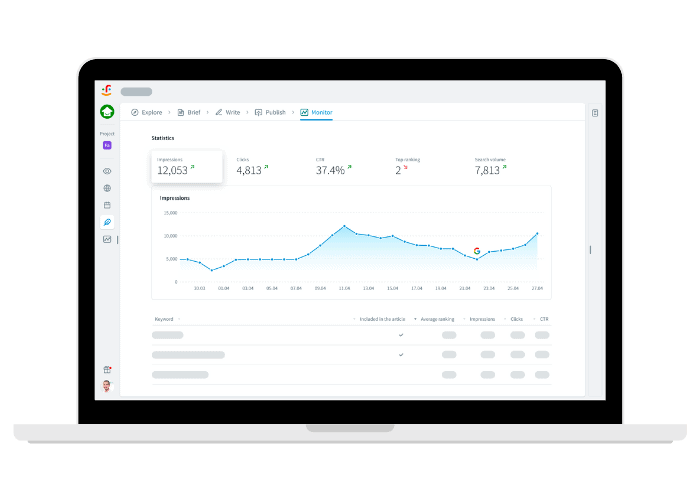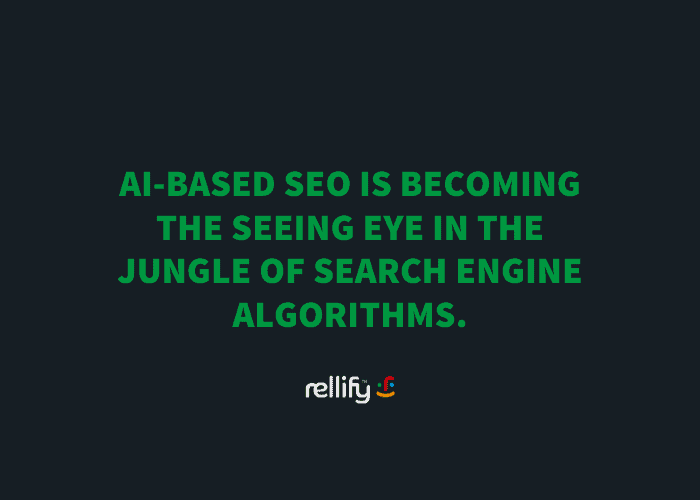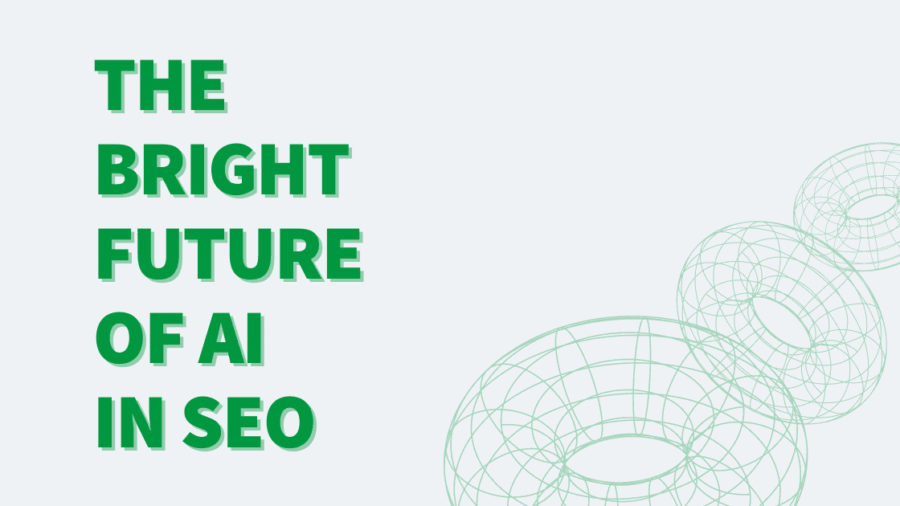Last Updated November 23, 2022 ago | Published: April 26, 2021
The days of tedious SEO with keywords are coming to an end. AI-based solutions are changing the market. Innovative services are implementing AI in SEO, offering greatly increased relevance and visibility.
If you search for artificial intelligence in Google Images, you’ll see a variety of human-like robots, which are often found at technology trade shows. This describes well how a large part of society imagines artificial intelligence: robots that, step by step, take over more and more of a human’s work on a 1-to-1 basis. But AI is already much different than that. Especially in the field of search engine optimization (SEO), there are significant optimization opportunities that can be exploited with AI.
The use of such AI in SEO increases not only the effectiveness, but also the efficiency of the resources used. Complex strategy insights in the form of content development, conversion and usability optimization can be handled by AI both faster and more reliably. Through technical optimization, machine learning and natural language processing, AI in SEO will increasingly dominate the market at breakneck speed. Based on learning processes, no optimization opportunity will go undetected. Gaps in SEO will be fixed and specific articles or even entire websites will be given relevance with search engines.
Who is already using AI in SEO & Content?
AI use in content is not a dream of the future, but a reality that is already being lived today. In the summer of 2020, Microsoft announced that it would replace part of its editorial team with AI solutions. The primary focus is on the MSN news page. There, the technology will filter out which articles are suitable for serious journalism. Until then, this task had been left to editors. In this way, violent or inappropriate content in particular will be prevented from appearing on the home page.
Sitecore, another software company, also uses AI to optimize business processes and is focused on effective governance, streamlining production, and modularizing content for reuse. Currently, AI drives Sitecore’s automated content tagging and image sourcing, as industry analyst firm Gartner reports. This shows the potential of AI optimizing websites and enhancing marketing teams’ efficiency.
How does rellify use AI in SEO?
Startups like rellify are also using AI to develop better content, written by real people, informed by machine learning which then naturally ranks well in search engines. This process is also named IA – intelligence augmentation. This process succeeds in bringing the user’s search intent to the forefront. Currently, keywords are still the biggest focus of the SEO process. With AI, the entire planning process of SEO activity based on keywords is redefined, from keyword research and data collection to keyword prioritization and keyword mapping. The user’s search intent replaces keywords and the strategic planning process is simplified by the supporting AI in SEO.

What are the key benefits of AI in SEO?
A primary benefit of using AI in SEO is efficiency and speed. The increase in efficiency can even be quantified in monetary terms. Content creators in the company can work faster and more efficiently with the support of AI in SEO. In addition, many companies use the services of SEO agencies, which will become faster and more cost effective with the support of AI with deep learning. It will become easier over time to create entire websites with a few clicks while still maintaining relevance to search engines. The improvement in search engine ranking can also be accurately measured. This will have a direct impact on sales success, especially for online stores, but also for most other businesses.
Machine learning or deep learning is not only helpful in the strategic planning and implementation process but also in improving content over time. Currently, relevant content is generally only revised after publication when reports show that click numbers are falling or the content is falling in the search rankings. AI supports online marketing in the ongoing monitoring and (human assisted) maintenance of content and ensures a largely constant high relevance for search engines.
How does Google deal with AI in SEO?
With the research project “Google Brain” and the acquisition of the AI specialist Deepmind in 2014, Google positioned itself as a leader in the field of artificial intelligence. Since CEO Sundar Pichai officially announced the change in strategy from “Mobile First” to “AI First” in 2016, it’s clear that AI will shape almost all areas of the company in the future. Algorithms are increasingly controlled by the AI system “RankBrain” which enables the search engine to learn by itself. In this way, Google is constantly improving its ability to answer unknown – i.e. never-before-asked – search queries. This also applies to SEO, where AI and machine learning in particular are becoming increasingly influential.

What does this mean for AI in SEO?
The question arises as to how AI in SEO will react to the changed conditions that develop through adjustments in search engine algorithms or ranking criteria. Can the respective AI solution adapt to this and also learn independently to optimize the content under new conditions or does its effectiveness suffer as a result? Until now, SEO always tried to adapt to existing algorithms manually and if the search engines changed the priorities in the order of rankings, online marketing managers in SEO had to quickly react to this. At present, it’s still unclear to what extent AI solutions will be able to respond independently. However, it’s likely that over time, AI-based SEO solutions will increasingly react autonomously or at least semi-autonomously to modifications. In summary, it’s clear that AI will become a huge part of the SEO market, and likely faster than expected. Research company Gartner stated in their 2020 Magic Quadrant for Content Marketing Platforms “By 2022, content marketers will produce more than 30% of their digital content with the aid of AI content-generation techniques”. Gartner further expects that AI will “increase productivity and advertising effectiveness but also disrupt the creative process”.
Since the beginning of digital technologies, the pace for the development of new tech is increasing exponentially. Achim Berg, President of the German Association for Information Technology, Telecommunications and New Media (Bitkom), also confirmed this to the AWS-Institute for Digital Products and Processes. In an interview in September, 2018, Berg said: “Digitization proceeds exponentially – if you don’t keep up at the beginning, you’ll have to take an even steeper path later on.”
Berg is not alone in this opinion. Pascal Finette, a lecturer in entrepreneurship and open innovation at Singularity University, shares the same thesis. In a 2018 interview, Finette called for exponential thinking on the part of entrepreneurs and founders in particular. This is the only way to master the upcoming hyperdigitization. Statements like these predict a growing relevance and bright future in the market for startups like rellify.
